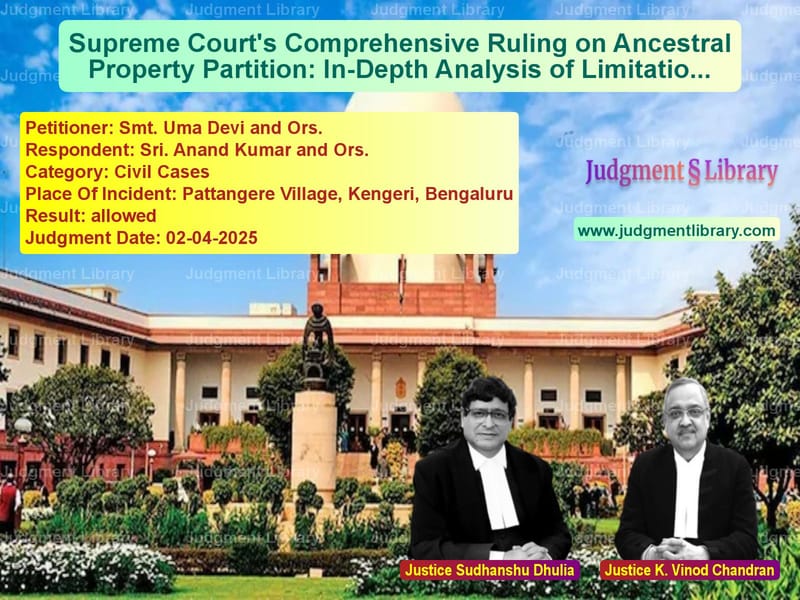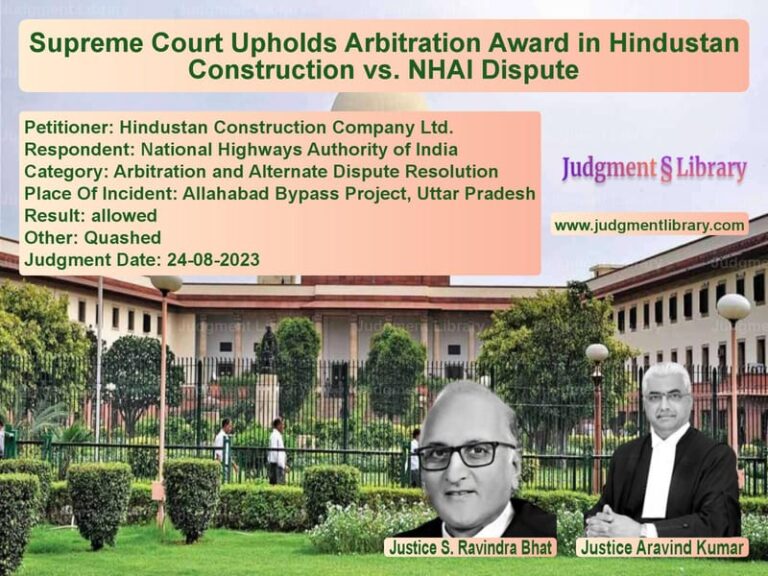Supreme Court’s Comprehensive Ruling on Ancestral Property Partition: In-Depth Analysis of Limitation Law and Plaint Rejection
In a landmark judgment spanning over 3000 words, the Supreme Court of India recently settled a complex multi-generational property dispute in Smt. Uma Devi and Ors. vs. Sri. Anand Kumar and Ors. (Civil Appeal No._____of 2025). The bench comprising Justices Sudhanshu Dhulia and K. Vinod Chandran delivered a comprehensive verdict that not only resolved the immediate dispute but also provided significant clarity on several critical aspects of property law, limitation statutes, and civil procedure.
Detailed Historical Background of the Case
The dispute concerned ancestral property located in Pattangere Village, Kengeri Hobli, Bengaluru South Taluk, originally owned by Boranna. The property’s journey through generations can be summarized as:
Family Tree and Property Devolution
- First Generation: Boranna (original owner) had four sons:
- Nanjundappa
- Siddappa
- Basappa (had six children including Shanthappa)
- Shivanna (had five children including Mangalamma)
- Second Generation: Alleged oral partition in 1968 among four brothers
- Third Generation: Registered sale deeds executed in 1978 by some family members
- Fourth Generation: Suit filed in 2023 by Mangalamma’s children (plaintiffs)
Detailed Chronology of Legal Proceedings
| Year | Event | Significance |
|---|---|---|
| 1968 | Alleged oral partition | Recorded in revenue documents |
| 1978 | Registered sale deeds executed | By Shivanna’s daughter-in-law and others |
| 2023 | Suit filed (O.S. No. 6768/2023) | After 55 years of partition, 45 years of sale deeds |
| 2023 | Trial Court’s Order 7 Rule 11 dismissal | Found suit barred by limitation |
| 2025 | High Court’s remand order | Directed trial on merits |
| 2025 | Supreme Court’s final judgment | Restored Trial Court’s order |
Exhaustive Arguments Presented
Defendants’ Detailed Submissions (Appellants before SC)
Senior Counsel Mr. Sundaram presented a multi-layered argument:
“Your Lordships, this is a classic case of litigation archaeology where plaintiffs are digging up settled property rights after half a century. The revenue records from 1968 clearly show mutation following family partition, and the registered sale deeds from 1978 operated as constructive notice to the world under Section 3 of Transfer of Property Act.”
Their legal submissions included:
- On Limitation:
- Cited Suraj Lamp Industries (2012) 1 SCC 656 on constructive notice through registration
- Relied on Mukund Bhavan Trust 2024 SCC OnLine SC 3844 regarding limitation starting from registration date
- On Order 7 Rule 11:
- Referenced Madanuri Sri Rama Chandra Murthy (2017) 13 SCC 174 on plaint rejection principles
- Quoted Dahlben v. Arvindbhai Kalyanji Bhanusali (2020) 7 SCC 366 on preventing frivolous litigation
- On Family Settlement:
- Produced original revenue records showing 1968 partition
- Demonstrated continuous possession by defendants’ branch since 1968
Plaintiffs’ Comprehensive Rebuttal (Respondents before SC)
The plaintiffs’ counsel advanced several nuanced arguments:
“My Lords, the defendants are trying to shortcut due process by invoking Order 7 Rule 11. The question of when we gained knowledge of these ancient transactions is inherently factual and requires trial. The registered documents may give notice to purchasers, but not necessarily to all family members across generations.”
Their detailed counterpoints included:
- On Knowledge and Limitation:
- Asserted that limitation should run from actual knowledge date
- Claimed first awareness of partition only in 2020
- Argued that registered documents don’t automatically imply family-wide knowledge
- On Oral Partition Validity:
- Challenged evidentiary value of revenue entries for proving partition
- Contended that oral partitions require stronger proof
- On Order 7 Rule 11 Scope:
- Cited cases where courts permitted trial despite apparent limitation issues
- Argued that plaint discloses cause of action when read liberally
Court’s Meticulous Analysis and Reasoning
On Evidence of Partition
The Court conducted a forensic examination of documentary evidence:
“We have gone through the revenue records, as placed before us, and it is evident that this settlement was indeed acted upon. The revenue records indicate the names of each of Boranna’s four sons and also that the property had been mutated in their respective names, the reason assigned for the change in the revenue records is the family partition of the year 1968.”
On Constructive Notice Doctrine
The judgment contains an extensive discussion on registration effects:
“Registration of a document gives notice to the world that such a document has been executed. Registration provides safety and security to transactions relating to immovable property… It enables people to find out whether any particular property with which they are concerned, has been subjected to any legal obligation.”
On Limitation Law Application
The Court’s analysis of limitation aspects spans several paragraphs:
“In the case at hand, partition took place way back in the year 1968… The suit is filed in the year 2023, i.e. after a period of 55 years… These sale deeds have been attached, and on perusal it is observed that these were in fact registered sale deeds… The plaintiffs cannot reignite their rights after sleeping on them for 45 years.”
On Order 7 Rule 11 Parameters
The judgment elaborates on when plaint rejection is appropriate:
“The plaint can be rejected under Order VII Rule 11 if conditions enumerated in the said provision are fulfilled… If on an entire and meaningful reading of the plaint, it is found that the suit is manifestly vexatious and meritless in the sense of not disclosing any right to sue, the court should exercise power under Order VII Rule 11, CPC.”
Final Decision and Directions
After this exhaustive analysis, the Court concluded:
- Allowed the appeals filed by defendants
- Set aside the High Court’s remand order dated 08.01.2025
- Restored the Trial Court’s order rejecting the plaint
- Held the suit barred by limitation
- Found no cause of action disclosed in plaint
Broader Legal Implications
The judgment establishes several important precedents:
Property Law Principles
- Evidentiary value of revenue records in proving family partitions
- Legal sanctity of oral partitions when corroborated by subsequent conduct
- Interpretation of ‘constructive notice’ under Transfer of Property Act
Limitation Law Clarifications
- Limitation starts from registration date for registered documents
- Burden shifts to plaintiff to prove later knowledge date
- Courts shouldn’t entertain ancient claims without cogent explanation
Civil Procedure Aspects
- Expanded scope of Order 7 Rule 11 when limitation is apparent
- Duty of courts to prevent abuse of process through belated claims
- Parameters for distinguishing between triable issues and frivolous litigation
Critical Commentary
The judgment raises several important questions for legal practitioners:
- How should courts balance between preventing frivolous litigation and protecting genuine claims?
- What constitutes sufficient proof of ancient family arrangements?
- To what extent can registration serve as notice to subsequent generations?
- How should courts handle cases where legal rights conflict with family equities?
This comprehensive analysis demonstrates how the Supreme Court has attempted to bring clarity to complex areas of property and limitation law while emphasizing the need for timely assertion of rights.
Petitioner Name: Smt. Uma Devi and Ors..Respondent Name: Sri. Anand Kumar and Ors..Judgment By: Justice Sudhanshu Dhulia, Justice K. Vinod Chandran.Place Of Incident: Pattangere Village, Kengeri, Bengaluru.Judgment Date: 02-04-2025.
Don’t miss out on the full details! Download the complete judgment in PDF format below and gain valuable insights instantly!
Download Judgment: smt.-uma-devi-and-or-vs-sri.-anand-kumar-and-supreme-court-of-india-judgment-dated-02-04-2025.pdf
Directly Download Judgment: Directly download this Judgment
See all petitions in Property Disputes
See all petitions in Succession and Wills
See all petitions in Landlord-Tenant Disputes
See all petitions in Contract Disputes
See all petitions in Damages and Compensation
See all petitions in Judgment by Sudhanshu Dhulia
See all petitions in Judgment by K. Vinod Chandran
See all petitions in allowed
See all petitions in supreme court of India judgments April 2025
See all petitions in 2025 judgments
See all posts in Civil Cases Category
See all allowed petitions in Civil Cases Category
See all Dismissed petitions in Civil Cases Category
See all partially allowed petitions in Civil Cases Category







